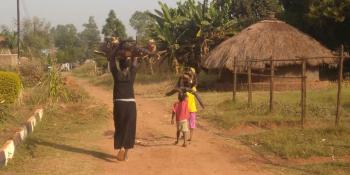Eileen’s year spent in Zambia was unforgettable. Not just because it was the first year of married life with her husband, but also for the extreme highs and lows of her stint volunteering in the children’s ward of a small rural hospital.
The smell of rain on baked earth summons memories of a village in rural Zambia. Some recollections seem surreal, so far removed from my life now.
There was the night I spent trying to treat a young child in a swirling storm of locusts. The electricity was off, and the locusts kept flying in front of the torch we were using. The staff around me were collecting bags of locusts as a tasty snack.
I remember the hospital security guard casually kicking a snake out of the way as we walked into hospital. Watching a lizard swallow a large centipede, or a tortoise taking shelter in our porch during a downpour.
Some things are universal
Other memories are triggered by events now I’m back home in Ireland. For example the vaccination debate, which I’ve learned is worldwide.
The difference is that in rural Zambia measles is more often fatal. There, the rejection of vaccines seemed to stem from mistrust of Western medicine.
Losing both a seven-month-old and a young man to measles in that year has made me a lifelong supporter of efforts to improve worldwide vaccination rates.
‘Fake news’ and misinformation are also universal. I once had difficulty convincing a grandmother to let her child have oxygen. She was convinced we were performing an exorcism, while we were desperately trying to save a child’s life. After the granddaughter recovered, the grandmother became a staunch supporter.
I remember people who had exhausted every alternative medicine avenue before bringing their gravely ill child to our door – the stakes were high for our western medicine to succeed and sometimes the odds were too highly stacked against us.
Adjusting to married life in Lumezi
My husband and I spent our first year of married life in Lumezi, this rural Zambian village, over three hours' drive from the nearest supermarket (and without any transport for much of our time).
My husband is also a doctor. He looked after the adult wards as well as managing the donations we received. These were used to purchase essential medicines for the hospital – without which there was little point in having doctors!
It was, in many ways, a baptism of fire – we were the first western doctors to spend any time at this small hospital.
The first few months were spent adjusting expectations on both sides.
In Zambia all doctors are surgeons – it took some time for us to establish that while not surgeons, we were experienced and competent doctors.
Rather than running a whole hospital, we narrowed our focus. I worked on the children’s ward, focusing on malnutrition and HIV.
The highs
We had some success stories – in particular, the infant mortality rates halved while we were there.
We found oxygen tanks that had been donated to the hospital – growing mould in a corner. We cleaned them up, and put them to use. Once staff saw the lifesaving difference they made, their use became more common.
We worked hard to get a consistent malnutrition service running. I remember a remarkable day when we were able to discharge triplets who had been on the malnutrition ward for weeks.
We saw one child so gravely ill that his mother had simply given up. She watched us work on her son, using a needle to get fluid in through his shinbone, as he was so dehydrated. As he recovered and began to talk and laugh again, her despair turned to joy.
Simply having a daily ward round and reviewing every patient made a difference, and the nurses began to have the confidence to bring problems to us.
In our time there – a three-month period during the rainy season when malaria rates are high – the children's mortality rate was probably about halved.
The lows
"We still hope for a day when all children’s lives will be seen as of equal value."
Other times we were less successful. I still remember those cases.
One small child was seriously ill with meningitis. We treated him and he improved, but the muscles in his legs remained stiff; irreversible nerve damage from the infection.
Every month his family brought him to the clinic. Every month I explained how we couldn’t make him better: the physiotherapy services we enjoy in Ireland were simply not available.
Then there was a small child we treated for malnutrition and malaria. We gave his family an appointment with the clinic to follow up – they never returned to our hospital.
Hope for the future
Years on from our time in Zambia, we now have small children of our own who keep us close to home, for now, and remind us how precious life is.
They remind us of the value placed on our children’s lives with a full healthcare system in place, a value we tried to extend to the children we treated in Zambia.
We still hope for a day when all children’s lives will be seen as of equal value.
Read more
A matter of life and death for one nurse in Uganda
Gerieke Zandberg, a paediatric nurse from the Netherlands, is working to save babies’ lives at Gulu Hospital in Uganda.

10 snapshots into life as a volunteer doctor in Uganda
Hi, I’m Dr Lierka Rodriguez. I am a volunteer obstetrician and gynaecologist working in rural Uganda. Here are some of my favourite moments of my time as a volunteer.
